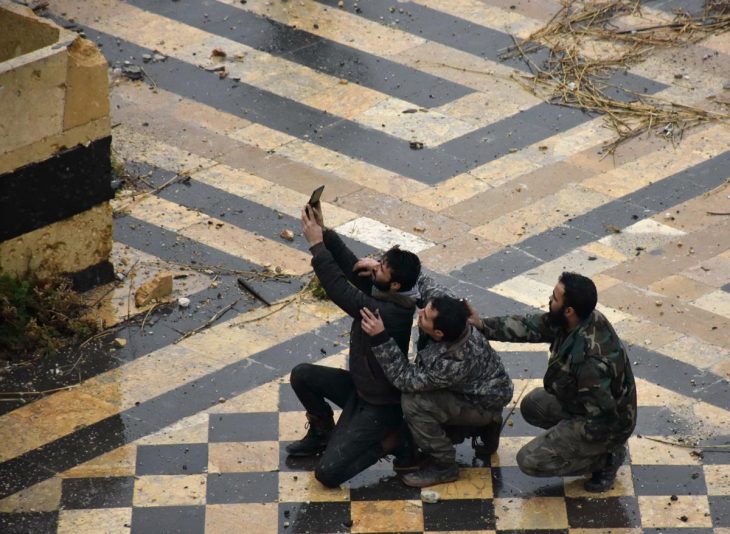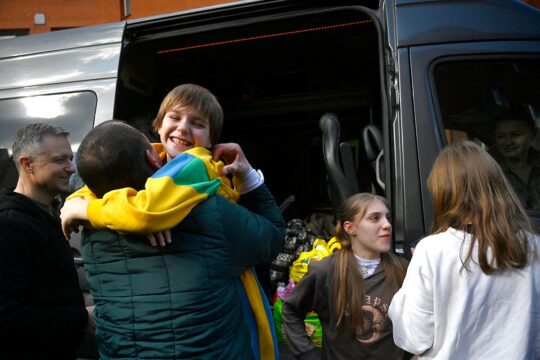Oussama Achraf Akhlafa, now 24 years old, had his photo taken during his stay with the terrorist organization Islamic State in Syria. On the picture he is standing with a broad smile next to a bloodstained dead man in a red-orange overall who had been crucified. Akhlafa distributed the image through Facebook. By doing so he committed the war crime of violating the personal dignity of the victim, the court in The Hague ruled on 23 July 2019. The judges also convicted him for participating in a terrorist organisation, as Islamic State is considered, and preparing terrorist crimes. He was sentenced to a prison term of seven years and six months – roughly what the prosecution had demanded.
During the trial hearings earlier this month the Dutch prosecution explained that crimes such as public executions, beheadings and crucifixions were part of IS’s policy to manifest itself in the self-proclaimed caliphate in Syria and Iraq, and to instil fear among the population. With respect to the image of the crucified man, Dutch investigators discovered that the photo matched a film of the execution which showed that the victim had previously been arrested. While the man sat kneeled on the street, with his hands tied behind his back with tie-wraps, he was shot in the head with a pistol and hung on a wooden cross. Several sources concluded the victim was an Iraqi man named Neser Khalef Zowid.
“Proud” of the picture
The images also showed distinct objects in the landscape, such as a fighter jet on a pedestal, a lamp post and a minaret. Through geolocation the Dutch police established that the execution and crucifixion took place in Abu Kamal, a border town in Syria. The date of the execution and crucifixion is not fully clear, but the first pictures started to circulate on the Internet on 26 June 2015. A Dutch policeman in Utrecht was shown the photo of Akhlafa and the bloodstained crucified man on 13 July 2015. The photo was also found on a phone seized by the Dutch police on 2 July 2015.
When Akhlafa appeared before the judges during a trial hearing on 8 July 2019 he said he had been forced by other Islamic State members to have his picture taken, and that refusing would have put him in danger and could have led to his own crucifixion. “I have regrets,” he said, denying he distributed the photo. But in their verdict the judges rejected this version, stating Akhlafa was “actively posing” while “smiling broadly’, concluding that he was “proud” of the picture as he asked a friend whether she still had the photo because he wanted to use it as his profile picture.
A violation of the Geneva Conventions
The court concluded that the war of Islamic State against the Syrian regime was of a non-international character. This meant that the common Article 3 to the Geneva Conventions (which defines the treatment of civilians and combatants in war) is applicable. This article states that all persons in enemy hands – including soldiers who laid down weapons – require human treatment and it prohibits murder, mutilation, torture, humiliation and degrading treatment.
The Dutch judges ruled that by posing while laughing next to the deceased person, Akhlafa deepened the humiliation and dishonouring of the victim. His message was that the body was “a trophy” and that he himself was “superior”, thus violating the personal dignity of the Iraqi man, being well aware that the incident took place in the context of the armed conflict in Syria. This made it a war crime.
The prosecution also charged Akhlafa with distributing a photo of a dead woman (probably a killed Kurdish female fighter) lying in a pool of blood while someone placed a foot on her body. But the court found that he sent this picture to one person only and that he was not in the image himself. Another photo was filed where a man is holding the head of a decapitated woman, but it is unclear whether Akhlafa distributed that picture. The court acquitted him for these charges.
A case that follows a trend in Europe
The war crimes verdict fits a pattern. Other European countries such as Germany, Sweden and Finland have recently convicted individuals for the war crime of degrading and humiliating treatment of victims by posing with dead and mutilated bodies in pictures or videos. The Dutch prosecution listed these cases during the trial.
In Sweden an accused was convicted and sentenced to 18 months for posing and having his picture taken next to a severed head and several decapitated bodies. In another case in Sweden an accused received a prison term of eight months for posing next to dead and wounded persons. A German court sentenced a person to a two-year prison term for posing next to heads which were put on spikes and having distributed these images. Finland convicted an Iraqi migrant of a war crime after he posted images of himself on Facebook with the head of an Islamic State group fighter. Social media have been a source for European prosecutors and investigators in cases against individuals who committed international crimes abroad.
Facts and claims about Akhlafa
Akhlafa travelled on 24 October 2014 from The Netherlands to the “caliphate”, after two failed attempts. During the trial the young man gave the judges snapshots from his life. He was homeless at the age of 18, had dropped out of school and couldn’t find a job. He failed when trying to join the Dutch army and the French Foreign Legion. He was “desperate” and “depressed,” he told the judges. His motive to join Islamic State was because “the country” needed help. He claimed he joined the medical services, first working on the parking of a hospital, later cleaning wounds and giving vaccinations. “I have never killed a person or joined the fighting,” Akhlafa told the court.
The judges, however, confronted him with the fact that he is on photos carrying big guns and wearing combat fatigues. “Indeed, I am on many pictures with weapons, but I did it just to play the tough guy” and to show off as “a macho,” he said. As it appears, his name was also on an Islamic State payroll which was seized during a military operation of the international coalition on 28 June 2017 in Mosul, Iraq. The payroll shows that Akhlafa was part of a sniper battalion for three months. There are also incriminating chats with friends back in The Netherlands in which he said things like: “Sniping is the best there is, but it is the most dangerous.”
On 3 September 2016 Akhlafa left Islamic State and went to the Free Syrian Army. Turkey arrested him on 2 November 2016, convicted him for joining a terrorist organisation and sentenced him to a prison term of 6 years and three months. He was nevertheless released on the day of the verdict, on 17 May 2018. Akhlafa then found himself back to The Netherlands where he was arrested. “I am being portrayed as a terrorist, madam,” he told the court, “but I returned voluntarily and I want to do good.”
Pointing to the “double jeopardy” clause that prohibits multiple punishment for the same offence his Dutch defence lawyer Yasar Özdemir argued that his client could not be prosecuted again in The Netherlands for participation in a terrorist organisation. But the judges stated that the clause did not apply as the Turkish prison term was not fully carried out.
The risk of doing it again
While Akhlafa has an average intelligence, he has a personality disorder with narcissistic and anti-social characteristics, the court noted. The court stated there are signs that he was still a supporter of a Jihadi-Salafist ideology and that he rejected a democratic rule of law. During the trial Akhlafa distanced himself from IS, but he also stated: “I don’t believe in the Dutch law, but I respect it. When traffic lights are green you can walk, red means you have to stop.” According to social rehabilitation experts the risk that he would re-offend is high. “I need help to build my life. I didn’t make it in the past. I am afraid of standing alone and I can’t succeed on my own,” Akhlafa said during his trial.






